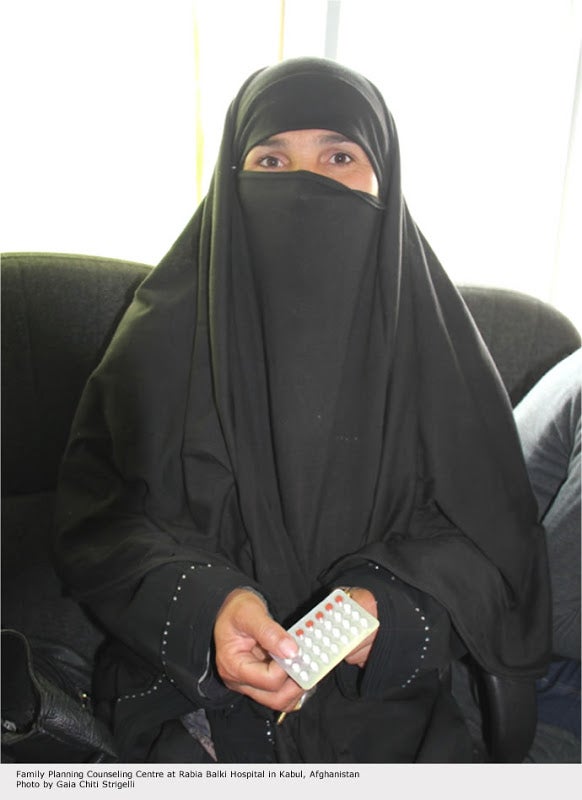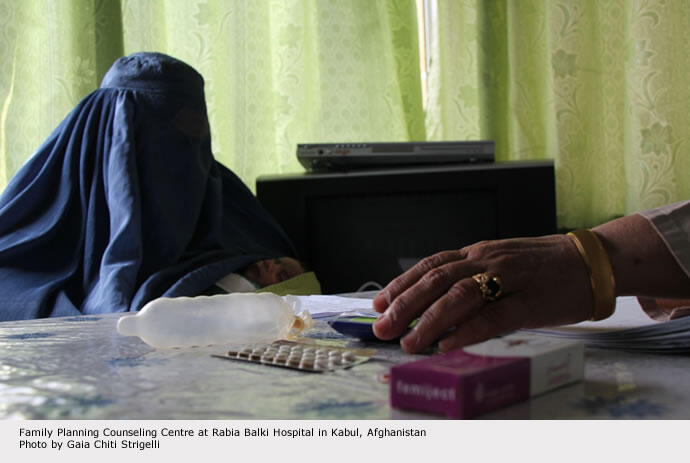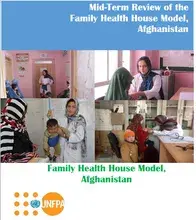Use of modern family planning methods in Afghanistan has doubled from 10 percent in 2003 to 20 percent in 2012. Still much more needs to be done in order to achieve the Government of Afghanistan target to increase the Contraceptive Prevalence Rate to 40% by 2016.
UNFPA Afghanistan supports the Ministry of Public Health to take steps to meet the family-planning needs and to assist couples and individuals to achieve their reproductive goals and give them the full opportunity to exercise the right to have children by choice.
"It is important and essential that we talk about family planning. In my school nobody knows anything about reproductive health. My brother's wife lost her baby, I told her what I learned and now she has healthy baby" said Frozan, one of the over 1000 peer educators trained by UNFPA to engage other youth in discussions about Adolescent Sexual Reproductive Health (ASRH) issues, seeking to promote health-enhancing knowledge and skills.
With 327 deaths per 100,000 live births reported in AMS 2010, Afghanistan is still considered one of the most dangerous countries to be a mother. In this scenario family planning is an important strategy to reduce Maternal Mortality is the unanimous message from the first Regional Conference on Promoting Family Planning organized by MoPH with the technical and financial support of UNFPA Afghanistan in February 2012. (Click here to download the Conference Final Report in English)
Although more than ninety in currently married women know of a method of contraception, only 20 per cent use some kind of contraceptive method with clear socio-economic differences. Urban women are twice as likely to use family planning as rural women; the use of modern contraception by women with no education and women with higher education is 19 percent and 35 percent respectively; and there is a large gap in contraceptive use between the poorest, 16 percent, and the wealthiest quintile, 29 percent.
Despite considerable achievement that can be attributed to an increased education about birth spacing and maternal health, to an higher engagement of women in organizing women's community health committees and involvement of men, especially religious leaders in contraceptive education and to abundant contraceptive supplies, many are the persistent challenges.
Because Afghanistan is a country where traditions constitute many barriers to women accessing health services, breaking down socio-cultural barriers is a priority as well as creating demand of family planning by continuing to meet the needs of existing family planning users and by motivating current non users of family planning to become users. With this purpose UNFPA developed a video animation to promote positive acceptance of birth spacing within a highly conservative society like Afghanistan. (Click here to see the video animation on Family Planning in English, Dari and Pashto)
"Family Planning, as well as antenatal care and assisted delivery are the three strategies to reduce maternal mortality in Afghanistan and fundamental steps forward to women empowerment" said Dr. Laurent Zessler, UNFPA Representative
A direct engagement of religious leader on promoting family planning and birth space consistently with Islamic teaching is considered as a potentially very significant intervention therefore in December 2012 UNFPA supported MoPH to organize the first National Conference on Islam and Family Planning resulting in an official statement signed by religious leaders coming from more than 22 provinces of Afghanistan. (Click here to download the Religious Leader Statement in English, Dari and Pashto)






